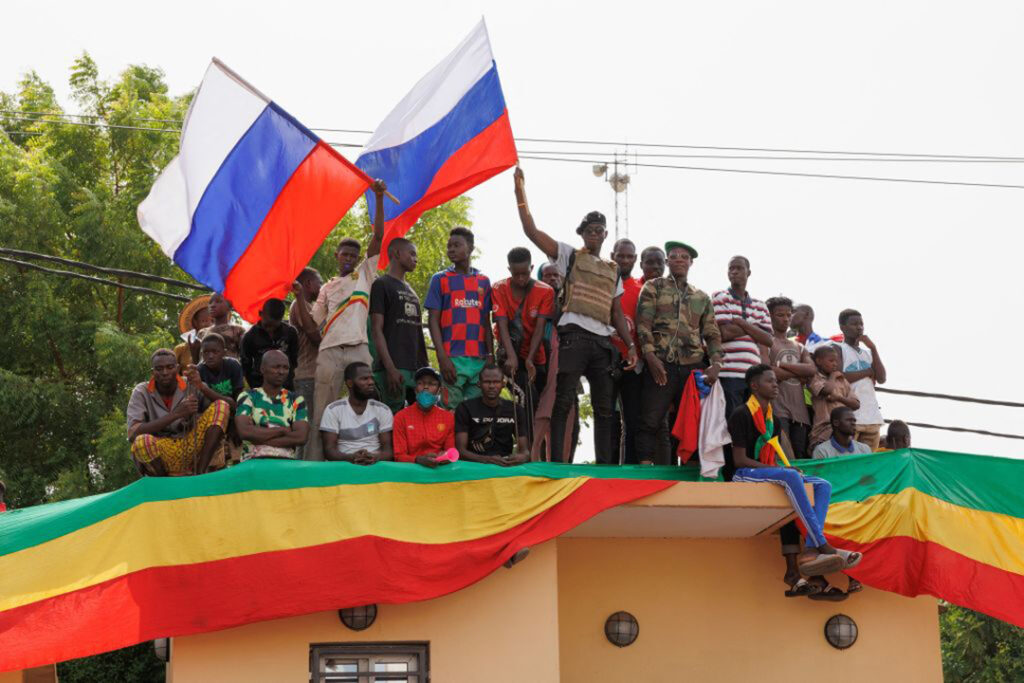ADF STAFF
Experts say Russia is expanding influence efforts on the continent through the Wagner Group, designed to bolster African governments that partner with its mercenaries, such as the Central African Republic (CAR) and Mali. This campaign harms continent-wide efforts to promote democracy and self-determination, according to Djibril Fofana, a Burkina Faso-based advisor for the Tony Blair Institute for Global Change.
Fofana explained in The Africa Report that these campaigns are aimed primarily at discrediting African democratic systems and legitimizing the Russian authoritarian model as an alternative for leaders trying to maintain power.
Russian disinformation campaigns in Africa have included everything from hosting beauty pageants and screening propaganda films to rewarding sympathetic social media personalities and even creating a video of a purported mass grave in Mali.
Taken together, the Russian messaging efforts attempt to blame democracy for insecurity, and portray the Russian “strongman” model and mercenary support as a credible alternative.
The reality is dramatically different.
In five years since Wagner mercenaries first arrived in Africa, violence and human rights violations have dramatically escalated in every country where they operate.
- In the CAR, which invited Wagner forces as military trainers, the mercenaries have taken an active role in the fight against rebel militant groups. This has included the killing of innocent civilians through planting land mines, attacking villages and executing suspected rebel militants.
- In Mali, Wagner fighters were part of a March 2022 attack on the community of Moura that lasted for five days and left 300 people dead. The Moura massacre contributed to a 150% jump in violence in Mali over 2021, according to ACLED, the Armed Conflict & Event Data Project.
- In Libya, Wagner forces sided with troops led by Gen. Khalifa Haftar and left behind hundreds of booby-trapped explosives and other munitions in civilian areas when Haftar’s forces retreated after failing to take Tripoli in 2020.
Russia’s disinformation campaign also obscures another aspect of Wagner’s operations in Africa: the plundering of natural resources. Everywhere Wagner operates, its affiliates follow, laying claim to gold, diamonds and oil that can then be funneled back to Russia to finance its ongoing invasion of Ukraine.
Artisanal miners frequently are the victims of Wagner’s tactics, which have included killing and driving out miners along the CAR-Sudan border to take the resources there for themselves. Wagner’s gold smuggling operations in Sudan support that country’s ruling junta while robbing Sudan of millions of dollars in mining revenue and degrading the environment.
Along with Wagner’s own disinformation tactics, Russia launders its disinformation through African sources by feeding stories to local media, creating fake accounts on social media channels, or promoting sympathetic internet celebrities to spread its message.
Wagner used those tactics in April 2022 to promote the idea that French troops, then operating in Mali, were responsible for a mass grave outside the community of Gossi. The claim went viral in the region, despite well documented, real-time proof that Wagner Group operatives manufactured the entire scene.
In October 2022, a youth forum at the Moscow State Institute on International Relations featured a French-Beninese social media influencer Kemi Seba, who regularly espouses pro-Russian and anti-Western messages to his Facebook and YouTube followers.
“Some of these influencers have gained quite a following recently, but the way to think about them is that they are just part of a broader disinformation system that Russia is deploying in Africa through Wagner,” Mark Duerksen, a research associate at the Africa Center for Strategic Studies, told the website Coda Story. “They fashion themselves as pseudo intellectuals adopting tropes from a deep history of Pan-Africanism to their purposes.”
Analysts suggest that along with attempting to discredit Western nations, Russia’s disinformation campaign also has another aim: to cover up the fact that Wagner is failing in its professed goal of helping countries eliminate extremism. Fofana cites Mali as an example.
“Predictably, Russian contractors have proved unable to face the threats from jihadist groups in Mali, let alone improve security or provide a sustainable solution to the conflict, and they show a complete disregard for the root causes of the conflict,” he wrote. “It is no secret that Wagner is ineffective on the ground.”

